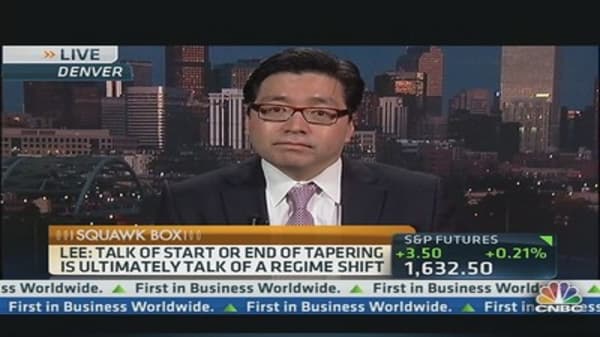JP Morgan's chief U.S. equity strategist said Monday he's still bullish on stocks despite Friday's selloff—the worst one-day decline in about seven weeks.
Thomas Lee also told CNBC he sees a shift from defensive stocks to cyclicals.
Despite Friday's drop, the Dow Jones Industrial Average and the S&P 500 Index were able to hold onto gains of about 2 percent for all of last month—logging their best May since 2009.
(Read More: Month-End Selloff: Stocks Drop 1%, but Major Averages Higher for May)
"The underlying bullish story [for stocks] is really intact," Lee said in a "Squawk Box" interview. "There's a story of wealth-effect helping the global consumer, particularly in the U.S. ... Housing continues to be really strong."
The out-performance of dividend stocks over cyclicals has been extreme, he said, with the valuation premium of defensive stocks at an almost 45-year high.
"If we're in a regime shift of rising [interest] rates and the U.S. economy is strengthening, everyone is going to start focusing on cyclicals' profit growth and that's going to favor the cyclical stocks," he said, adding that he thinks this might be the beginning of the shift that could lead the market for the next three to five years.
"The 1980s was all led by defensive stocks," he said, "but the '90s was a decade of cyclical outperformance."
Over the summer, he said, "maybe it's time to be moving that underweight of cyclicals to overweight."
He also said it might make sense to start buying technology stocks because the sector is delivering similar earnings growth and dividend yields as staples but at a price-to-earnings ratio of about 13 instead of about 20.
In recent weeks, concern has crept into the market about whether the Federal Reserve will soon start to taper its $85 billion a month bond-buying program.
"Until people feel there's a lot more evidence of stronger underlying economic growth—not just in the U.S. but globally—I do think people like that [Fed] safety-net," Lee said. But "we're pretty confident that we're going to see signs of much better global growth in the second half."
He said he remains bullish, but offered a scenario that might start to change his mind. "I still think we have a market that people only reluctantly believe. If we start seeing people embrace it, I think that's when we have to start getting worried."




